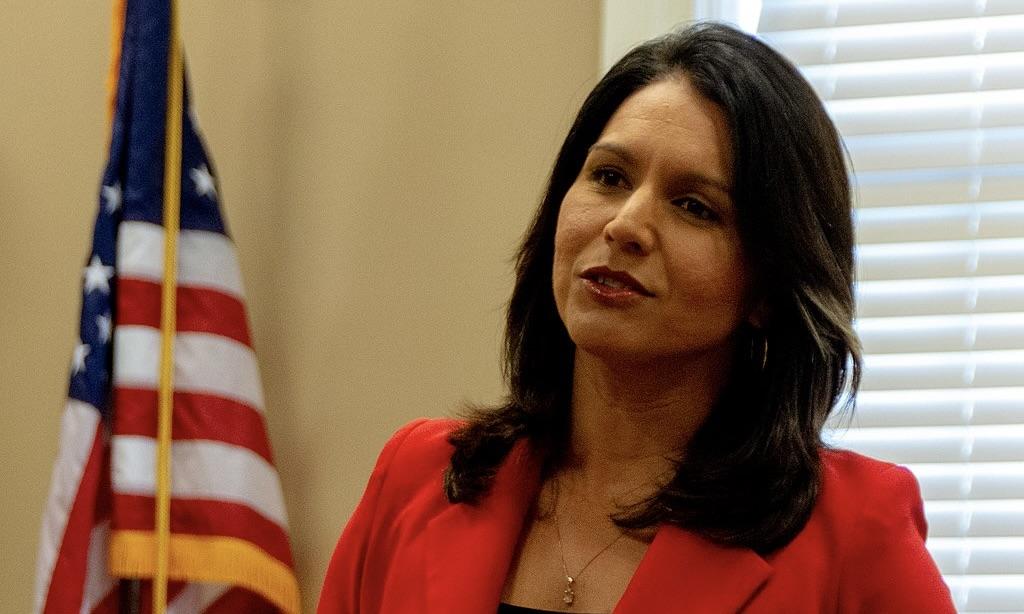President-elect Donald Trump’s nomination of former congresswoman Tulsi Gabbard as the next director of national intelligence has sparked heated debate, with critics raising concerns about her alleged links to Hindu nationalist organizations. While Gabbard’s military background and congressional tenure have garnered support, her ties to Indian Prime Minister Narendra Modi and the Rashtriya Swayamsevak Sangh (RSS) have drawn scrutiny from faith-based groups and political analysts alike.
RSS Links and Their Implications
The RSS, a Hindu nationalist group linked to the ruling Bharatiya Janata Party (BJP) in India, has faced accusations of inciting religious violence and pursuing an agenda that marginalizes non-Hindu communities. Modi, a lifelong RSS member, has been associated with policies criticized for exacerbating communal tensions in India.
Gabbard, a practicing Hindu, met Modi in 2019 and presented him with the Bhagavad Gita, a central Hindu scripture she describes as her “transcendental lifeline.” During her time in Congress, she opposed a resolution condemning RSS-related violence, citing the need to prioritize U.S.-India relations.
Journalist Pieter Friedrich and the Federation of Indian American Christian Organizations (FIACONA) argue that Gabbard’s ties to RSS-affiliated groups, including campaign donations, suggest a deeper alignment with Hindu nationalist ideals. Friedrich contends that such connections could influence U.S. foreign policy and compromise America’s stance on human rights.
Faith-Based Groups Speak Out
Faith leaders, particularly from Christian organizations, have voiced concerns about Gabbard’s nomination. FIACONA’s executive director, Neal Christie, warned that her appointment could embolden Hindu nationalist agendas and suppress religious minorities in India.
“Tulsi Gabbard’s ties to the RSS and financial support from its affiliates raise significant red flags,” Christie said. “This is about safeguarding America’s commitment to global religious freedom and human rights.”
Critics also point to a petition urging Congress to reject Gabbard’s nomination, emphasizing her association with groups accused of propagating anti-Christian and anti-Muslim violence.
Support and Deflection
Gabbard has dismissed allegations of ideological alignment with the RSS, emphasizing her loyalty to the United States. In a statement to Newsweek, she underscored her commitment to American values and national security.
Supporters highlight her military service and pragmatic approach to foreign policy, arguing that her Hindu faith and relationships with Indian leaders should not disqualify her from the role.
A Global Debate
Gabbard’s nomination arrives at a pivotal moment in U.S.-India relations, as Modi’s government faces international criticism for its handling of religious minorities. Gabbard’s potential appointment as director of national intelligence has reignited debates about the influence of foreign governments on U.S. policy.
While Gabbard’s qualifications are undeniable, her perceived affiliations with Hindu nationalist entities continue to overshadow her candidacy. As the Senate prepares to deliberate, the outcome will reflect broader concerns about global religious freedom, U.S.-India relations, and the integrity of American intelligence leadership.



 Trump Lifts 25% Tariff on Indian Goods in Strategic U.S.–India Trade and Energy Deal
Trump Lifts 25% Tariff on Indian Goods in Strategic U.S.–India Trade and Energy Deal  Japan’s Prime Minister Sanae Takaichi Secures Historic Election Win, Shaking Markets and Regional Politics
Japan’s Prime Minister Sanae Takaichi Secures Historic Election Win, Shaking Markets and Regional Politics  Antonio José Seguro Poised for Landslide Win in Portugal Presidential Runoff
Antonio José Seguro Poised for Landslide Win in Portugal Presidential Runoff  U.S.-India Trade Framework Signals Major Shift in Tariffs, Energy, and Supply Chains
U.S.-India Trade Framework Signals Major Shift in Tariffs, Energy, and Supply Chains  Japan Election 2026: Sanae Takaichi Poised for Landslide Win Despite Record Snowfall
Japan Election 2026: Sanae Takaichi Poised for Landslide Win Despite Record Snowfall  China Warns US Arms Sales to Taiwan Could Disrupt Trump’s Planned Visit
China Warns US Arms Sales to Taiwan Could Disrupt Trump’s Planned Visit  Trump Signs Executive Order Threatening 25% Tariffs on Countries Trading With Iran
Trump Signs Executive Order Threatening 25% Tariffs on Countries Trading With Iran  Trump Says “Very Good Talks” Underway on Russia-Ukraine War as Peace Efforts Continue
Trump Says “Very Good Talks” Underway on Russia-Ukraine War as Peace Efforts Continue  Federal Judge Restores Funding for Gateway Rail Tunnel Project
Federal Judge Restores Funding for Gateway Rail Tunnel Project  US Pushes Ukraine-Russia Peace Talks Before Summer Amid Escalating Attacks
US Pushes Ukraine-Russia Peace Talks Before Summer Amid Escalating Attacks  Trump Congratulates Japan’s First Female Prime Minister Sanae Takaichi After Historic Election Victory
Trump Congratulates Japan’s First Female Prime Minister Sanae Takaichi After Historic Election Victory  New York Legalizes Medical Aid in Dying for Terminally Ill Patients
New York Legalizes Medical Aid in Dying for Terminally Ill Patients  Nicaragua Ends Visa-Free Entry for Cubans, Disrupting Key Migration Route to the U.S.
Nicaragua Ends Visa-Free Entry for Cubans, Disrupting Key Migration Route to the U.S.  Jack Lang Resigns as Head of Arab World Institute Amid Epstein Controversy
Jack Lang Resigns as Head of Arab World Institute Amid Epstein Controversy  Israel Approves West Bank Measures Expanding Settler Land Access
Israel Approves West Bank Measures Expanding Settler Land Access  Trump Allows Commercial Fishing in Protected New England Waters
Trump Allows Commercial Fishing in Protected New England Waters  Netanyahu to Meet Trump in Washington as Iran Nuclear Talks Intensify
Netanyahu to Meet Trump in Washington as Iran Nuclear Talks Intensify 































